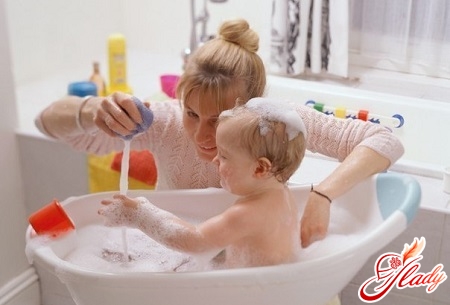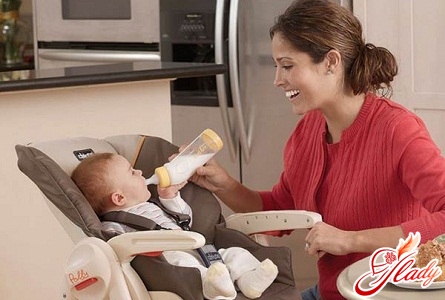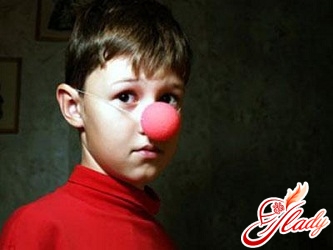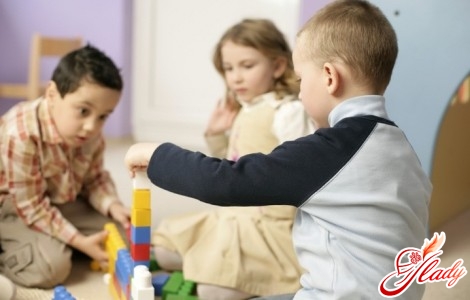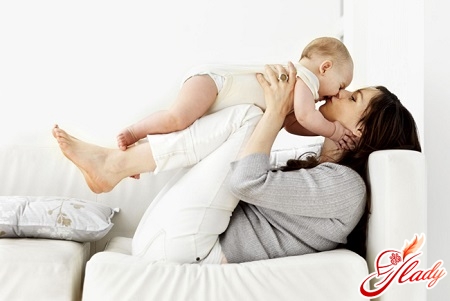 That's it! Nine months of waiting for a little miracle behind. It was not so scary. Experienced and pain, and maternity hospital, and the invasion of numerous friends after discharge, and endless inquiries about the state of health. Finally, you and the baby were alone. You can most consider the child without haste (usually immediately after birth, young mothers are taken in a panic count fingers and check whether all parts of the body of the newborn on the spot), to understand who the baby is like, and just quietly rejoice at motherhood. Enjoy the moment. Because then you will not have a free minute. Bathing-feeding-dressing-guljaniya-inoculations will cover you with your head like a snowball and you will be able to recover ... no, not at the graduation party of your child, but at least at the time when you give the baby to the kindergarten. But before that time, much remains to be done. Namely - to grow up the kid and to trace, that the level of its development corresponded to age. Of course, many mothers (almost all) are so blinded by the love for the child that they consider him the most-most. We do not argue. Undoubtedly, your baby is a real miracle. However, even the most wonderful kids need to be monitored. It is for this that we have prepared a small calendar for the development of the child by months, which will once again make sure that your child is no different from peers (or even ahead of their development).
That's it! Nine months of waiting for a little miracle behind. It was not so scary. Experienced and pain, and maternity hospital, and the invasion of numerous friends after discharge, and endless inquiries about the state of health. Finally, you and the baby were alone. You can most consider the child without haste (usually immediately after birth, young mothers are taken in a panic count fingers and check whether all parts of the body of the newborn on the spot), to understand who the baby is like, and just quietly rejoice at motherhood. Enjoy the moment. Because then you will not have a free minute. Bathing-feeding-dressing-guljaniya-inoculations will cover you with your head like a snowball and you will be able to recover ... no, not at the graduation party of your child, but at least at the time when you give the baby to the kindergarten. But before that time, much remains to be done. Namely - to grow up the kid and to trace, that the level of its development corresponded to age. Of course, many mothers (almost all) are so blinded by the love for the child that they consider him the most-most. We do not argue. Undoubtedly, your baby is a real miracle. However, even the most wonderful kids need to be monitored. It is for this that we have prepared a small calendar for the development of the child by months, which will once again make sure that your child is no different from peers (or even ahead of their development).
Calendar for the development of the child by month
Before you paint on the future achievements of yourchild by month, we want to warn you that each person is individual. Therefore, do not panic if your child is a little behind schedule and says fewer words than it should. 0 -1 month: sleep after birth From the side it may seem that the life of the baby is only to get a good sleep. In part this is true, since the dream of a newborn to one month lasts up to 22-23 hours a day. That is, your baby wakes up after birth only to eat and notify happy parents that it's time to change the diaper. By the end of the first month the child begins to be more interested in the surrounding world, and the waking period increases to 6 hours a day. As for other achievements, they are still rather modest. The baby begins to reach for her breast, recognizes her mother by smell and voice, turns her head towards loud sounds. But what makes parents especially happy is the first smile of the baby. Of course she is still completely unconscious, but try to explain this to the happy mom and dad, who catch every change in the behavior of their child. 1-2 months: here it is, Mom In the second month of his life, the kid begins to recognize the adults and smile at them quite consciously. He reacts to the appearance of a person in the room with a noticeable animation, distinguishes voices. At the same time the child learns: it is necessary to him to cry, as parents will take it on hands or will give a tasty pacifier. Do not doubt, all this knowledge the child uses by purpose. If the first time the hint was not understood by the parents, the child will repeat the demand louder, and then even the neighbors will hear it. And what do you want? To say something the kid does not know how. But it already turns out, turning over on a stomach, to hold a head at an angle of 45 degrees. Be sure to check this ability of the baby. If a two-month-old baby is still lying face down on his stomach, it is worthwhile to show it to the children's therapist and, possibly, to take a course of special massages to fix the situation. The next achievement is the baby, sitting at the mom's arms. He not only tries to grab her finger or cobble out extra breastfeeding, but also tries to keep her head straight. By the way, be sure to hold the neck of the baby, despite the fact that he, as you think, is already quite confidently holding his head. The fact is that the bones of the newborn are still fragile enough, and the spine is not able to withstand even such a small weight. But what a child, undoubtedly, touches those around, so it's a brand-name agukan. This manner of communication occurs in a baby at the age of 1 to 2 months. In addition, the baby actively squeezes his hands into fists and tries hard to gnaw out his own finger. 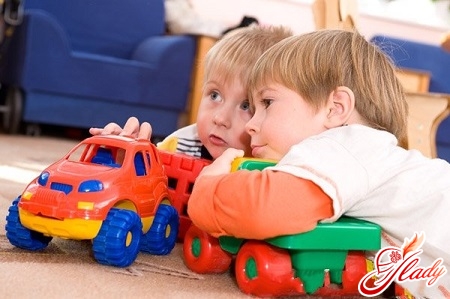 2-3 months: laughter, and only In the period up to 3 months the child can turn over from the back to the side, while lying on his stomach, he lifts himself on his elbows, holding his weight for about 10 seconds. The baby is so interesting all the time that he not only lifts his head, but also actively turns it from side to side, trying to examine the world around him. At the same time, for an incomplete 3 months the child begins to realize his power over the parents, and the anxious crying turns into a completely conscious whimsical whine. At this time it is already possible to hang a bunch of rattles over a cot. The kid is already with might and main pulls the pens. However, be careful, as if you catch a toy, the child will certainly want to taste it. Of course, it is not necessary to take away the rattle from the child, but it is absolutely necessary to take seriously the choice of toys (especially considering the "consciousness" of modern manufacturers and the quality of the dye that is added to the inexpensive plastic). But what else does the infants discover is their own hands and feet. For hours the kid can look at the find and, from habit, taste it. In addition, a small miracle laughs loudly, buzzes and actively asks for hands. 3-4 months: choose the favorites Here it is, the star time of mom. The child for three months realized that a fragile woman with a tender voice not only takes him in the arms more often than all, but also feeds on the first demand, therefore at the age of up to 4 months the baby obviously begins to allocate the mother among all those around him. Karapuz pronounces the first syllables, smiles in response to the smile of those around him and begins to play more consciously with the toys offered. He allocates for himself the most favorite rattles, takes them in hand, shifts from side to side. In addition, the child raises his head 90 degrees, lying on his stomach. Freely flips from side to side, moves around the crib and is able to express his mood. The kid laughs, if someone tickles him, loudly squeals with delight, calms down to the sound of music (of course, if it's not hard rock) and is actively interested in reflection in the mirror. 4-5 months: and where are you taking my toys? The kid is growing up. He holds his head firmly when he sits, easily holds a bottle of water, plays with suggested toys and protests if someone tries to take his rattle. The child is good at distinguishing strangers and unfamiliar surroundings. By the way, everyone else's frightens him, so do not invite many strangers into the house or take your baby with him on a regular basis. A child in 4-5 months willingly plays with his parents in ageless fun "ku-ku", tries to repeat his mother's nursery rhyme and plays with food. Lying, the baby tries to stand up, reaching out on his hands, and dropping the object, he will necessarily look where he rolled. 5-6 months: crawl, baby, crawl The active life of not only the child but also the parents begins. Six-month old child is already trying hard to sit, crawls on all fours, if he does not reach the toy near him and rolls funny from back to back. The kid becomes a gourmet, allocating his favorite dishes. At dinner, he tries to hold the cup by the handle, plays with his food and responds to his own name. In addition, the child with pleasure moves objects from one box to another, can spend hours comparing two toys and in his own way sing along with the melody heard. If the child is called familiar objects, he will surely find them in the room with his eyes and even express his attitude towards them to one clear sound.
2-3 months: laughter, and only In the period up to 3 months the child can turn over from the back to the side, while lying on his stomach, he lifts himself on his elbows, holding his weight for about 10 seconds. The baby is so interesting all the time that he not only lifts his head, but also actively turns it from side to side, trying to examine the world around him. At the same time, for an incomplete 3 months the child begins to realize his power over the parents, and the anxious crying turns into a completely conscious whimsical whine. At this time it is already possible to hang a bunch of rattles over a cot. The kid is already with might and main pulls the pens. However, be careful, as if you catch a toy, the child will certainly want to taste it. Of course, it is not necessary to take away the rattle from the child, but it is absolutely necessary to take seriously the choice of toys (especially considering the "consciousness" of modern manufacturers and the quality of the dye that is added to the inexpensive plastic). But what else does the infants discover is their own hands and feet. For hours the kid can look at the find and, from habit, taste it. In addition, a small miracle laughs loudly, buzzes and actively asks for hands. 3-4 months: choose the favorites Here it is, the star time of mom. The child for three months realized that a fragile woman with a tender voice not only takes him in the arms more often than all, but also feeds on the first demand, therefore at the age of up to 4 months the baby obviously begins to allocate the mother among all those around him. Karapuz pronounces the first syllables, smiles in response to the smile of those around him and begins to play more consciously with the toys offered. He allocates for himself the most favorite rattles, takes them in hand, shifts from side to side. In addition, the child raises his head 90 degrees, lying on his stomach. Freely flips from side to side, moves around the crib and is able to express his mood. The kid laughs, if someone tickles him, loudly squeals with delight, calms down to the sound of music (of course, if it's not hard rock) and is actively interested in reflection in the mirror. 4-5 months: and where are you taking my toys? The kid is growing up. He holds his head firmly when he sits, easily holds a bottle of water, plays with suggested toys and protests if someone tries to take his rattle. The child is good at distinguishing strangers and unfamiliar surroundings. By the way, everyone else's frightens him, so do not invite many strangers into the house or take your baby with him on a regular basis. A child in 4-5 months willingly plays with his parents in ageless fun "ku-ku", tries to repeat his mother's nursery rhyme and plays with food. Lying, the baby tries to stand up, reaching out on his hands, and dropping the object, he will necessarily look where he rolled. 5-6 months: crawl, baby, crawl The active life of not only the child but also the parents begins. Six-month old child is already trying hard to sit, crawls on all fours, if he does not reach the toy near him and rolls funny from back to back. The kid becomes a gourmet, allocating his favorite dishes. At dinner, he tries to hold the cup by the handle, plays with his food and responds to his own name. In addition, the child with pleasure moves objects from one box to another, can spend hours comparing two toys and in his own way sing along with the melody heard. If the child is called familiar objects, he will surely find them in the room with his eyes and even express his attitude towards them to one clear sound. 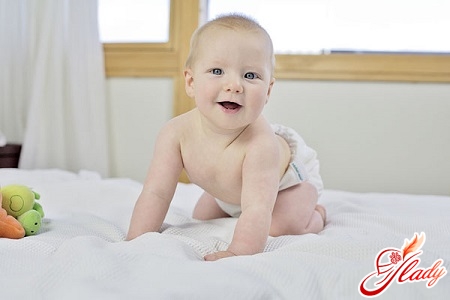 6-7 months: improve crawling skills. If a month ago your baby crawled a little uncertainly, now it's a real ac to overcome the distance on all fours. The child swings from side to side, crawling backwards and even developing unheard of speed, in order to have time before adults to grab a toy or catch up with a cat that is fleeing. If the child has to sit, it is already a proud posture with a straight back (sometimes, so as not to fall, the kids support the weight of the body with their hands). However, nevertheless pediatricians advise not to often put a six-month-old baby, giving him a little time to get stronger. That's what, no doubt, like a child of this age, so this is a mirror. More precisely - the reflection in it. The kid strokes the reflection with his hands, gently bows and in every way expresses his approval of what he saw. On my mother's strict "no" (for example, to try to tear a tail off a tail to a domestic pet), the child responds though not by obedience, but by a full understanding of what is happening. He likes to beat objects about each other, sing songs of his own composition and study the body with his hands (and sometimes even taste). 7-8 months: the first word It is during this period that parents often hear the first word of the baby. The child begins to become attached to his family and to be a little wary of outsiders (sometimes this is expressed by a cry of protest when a stranger tries to take him in his arms). But the world around the baby does not frighten. He continues to be actively interested in the contents of the apartment, moving all the same on all fours, but already in the category of "master of the extra class." The child is not trying to walk yet, but already stands without support for a few seconds. And if you offer him something to rely on, then the kid can stand long enough and even try to play with one hand. Reflection in the mirror more and more fascinates the tomboy. A fiery love of self grows into affectionate conversations and kisses of a mirror surface. The kid identifies the words "mom" and "dad" with people who proudly wear this title, and begins to rejoice at their arrival. 8-9 months: buy books If your offspring has more than 8 months, it's time to buy the first children's books with thick pages. Now the child will not only appreciate them, but they will be able to flip themselves. Of course, the letters are too early to teach, but if you read the child as much as possible, this will have a positive effect on the development of your child. At this age the child is very fond of clapping, tearing paper. He can play two toys at the same time and is well aware of which object is large and which is small. These children sit down on their own, love to jump and walk, holding their hands with their mothers, perfectly unfold during their brand-name crawling on all fours. However, do not expect that your baby will absorb only good habits. Eight-month-old children very often put their fingers wherever they are (hope that you put protection on the sockets?) And begin to quarrel if something went wrong according to their scenario. But such babies perfectly show parts of the body, they can find a toy that they "hid" before their eyes and will follow simple instructions with pleasure (especially if they receive sincere praise for this). 9-10 months: top-top, stomping baby In 9-odd months the baby starts walking, holding both hands for his mother. Apparently, this gives the child enthusiasm, because simultaneously with the ability to walk with a small tomboy, a love for dancing and imitation is developed. Do not feed the baby with bread, let me show you some animal or even copy someone from home. He likes to play with water and climb through the numerous boxes that tired mother forgot to close. But what you do not want a 9-month-old baby is to sleep. Apparently, the young researcher does not want to spend a second of precious time on sleep, realizing how much more interesting. Develop and children's fingers. Now the child can carry 2 objects at once in one palm. By the way, at this time it is already clear who your baby is right-handed or left-handed. In order to find out, put some toy in front of the baby (in the middle) and see what kind of hand he grabs her. 10-11 months: development continues The kid already walks by himself, adhering to the furniture. He gets up and sits down from any position, can lift a small object from the floor, grabbing his thumb and index finger. He perfectly understands the word "impossible" (but this does not mean that the baby will always listen to you) and tries to express his wishes not by crying, but by logical explanations. To do this, the vocabulary "give" appears in the lexicon and a couple of gestures, according to which the mother must understand what her child needs. Tea from a cup the kid drinks already independently (but nevertheless it is better to use "neproliviku"). Of the games during this period, the children are very fond of rolling the ball on the floor (especially if someone is playing with them from adults), and also play "ladushki." Well, children's books, of course, should not be put aside. Especially since children are already beginning to learn this or that fairy tale and ask to read it.
6-7 months: improve crawling skills. If a month ago your baby crawled a little uncertainly, now it's a real ac to overcome the distance on all fours. The child swings from side to side, crawling backwards and even developing unheard of speed, in order to have time before adults to grab a toy or catch up with a cat that is fleeing. If the child has to sit, it is already a proud posture with a straight back (sometimes, so as not to fall, the kids support the weight of the body with their hands). However, nevertheless pediatricians advise not to often put a six-month-old baby, giving him a little time to get stronger. That's what, no doubt, like a child of this age, so this is a mirror. More precisely - the reflection in it. The kid strokes the reflection with his hands, gently bows and in every way expresses his approval of what he saw. On my mother's strict "no" (for example, to try to tear a tail off a tail to a domestic pet), the child responds though not by obedience, but by a full understanding of what is happening. He likes to beat objects about each other, sing songs of his own composition and study the body with his hands (and sometimes even taste). 7-8 months: the first word It is during this period that parents often hear the first word of the baby. The child begins to become attached to his family and to be a little wary of outsiders (sometimes this is expressed by a cry of protest when a stranger tries to take him in his arms). But the world around the baby does not frighten. He continues to be actively interested in the contents of the apartment, moving all the same on all fours, but already in the category of "master of the extra class." The child is not trying to walk yet, but already stands without support for a few seconds. And if you offer him something to rely on, then the kid can stand long enough and even try to play with one hand. Reflection in the mirror more and more fascinates the tomboy. A fiery love of self grows into affectionate conversations and kisses of a mirror surface. The kid identifies the words "mom" and "dad" with people who proudly wear this title, and begins to rejoice at their arrival. 8-9 months: buy books If your offspring has more than 8 months, it's time to buy the first children's books with thick pages. Now the child will not only appreciate them, but they will be able to flip themselves. Of course, the letters are too early to teach, but if you read the child as much as possible, this will have a positive effect on the development of your child. At this age the child is very fond of clapping, tearing paper. He can play two toys at the same time and is well aware of which object is large and which is small. These children sit down on their own, love to jump and walk, holding their hands with their mothers, perfectly unfold during their brand-name crawling on all fours. However, do not expect that your baby will absorb only good habits. Eight-month-old children very often put their fingers wherever they are (hope that you put protection on the sockets?) And begin to quarrel if something went wrong according to their scenario. But such babies perfectly show parts of the body, they can find a toy that they "hid" before their eyes and will follow simple instructions with pleasure (especially if they receive sincere praise for this). 9-10 months: top-top, stomping baby In 9-odd months the baby starts walking, holding both hands for his mother. Apparently, this gives the child enthusiasm, because simultaneously with the ability to walk with a small tomboy, a love for dancing and imitation is developed. Do not feed the baby with bread, let me show you some animal or even copy someone from home. He likes to play with water and climb through the numerous boxes that tired mother forgot to close. But what you do not want a 9-month-old baby is to sleep. Apparently, the young researcher does not want to spend a second of precious time on sleep, realizing how much more interesting. Develop and children's fingers. Now the child can carry 2 objects at once in one palm. By the way, at this time it is already clear who your baby is right-handed or left-handed. In order to find out, put some toy in front of the baby (in the middle) and see what kind of hand he grabs her. 10-11 months: development continues The kid already walks by himself, adhering to the furniture. He gets up and sits down from any position, can lift a small object from the floor, grabbing his thumb and index finger. He perfectly understands the word "impossible" (but this does not mean that the baby will always listen to you) and tries to express his wishes not by crying, but by logical explanations. To do this, the vocabulary "give" appears in the lexicon and a couple of gestures, according to which the mother must understand what her child needs. Tea from a cup the kid drinks already independently (but nevertheless it is better to use "neproliviku"). Of the games during this period, the children are very fond of rolling the ball on the floor (especially if someone is playing with them from adults), and also play "ladushki." Well, children's books, of course, should not be put aside. Especially since children are already beginning to learn this or that fairy tale and ask to read it. 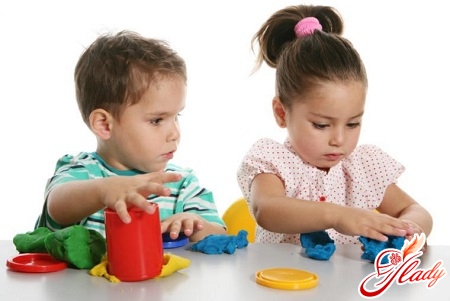 11-12 months: progress is evident. In the year the kid already sits alone, walks, with pleasure constructs pyramids and other complex constructions of cubes. The child shows independence and can refuse any food or, on the contrary, ask to add it. And he does not eat ordinary children's cereal, but bites off solid food (this process must be carefully controlled so that the baby does not choke). The child freely recognizes familiar adults, names them by name. In the children's vocabulary there are already about 15 words (albeit fuzzy) that can easily be explained to parents. By the way, you can not go to work with impunity. If your care is noticed by the child, then he will certainly begin to cry, so show miracles of wit and do not injure the child's psyche. This list can be continued indefinitely. However, you must understand that the more you pay attention to your child, the better it will develop. Therefore, if the friend's son is already reading poetry, and your own can not ask for bread and butter, then it's not the genes that are to blame, but you yourself. Replace daily gatherings at the computer for games with the child, and he will surely please you with a new word, achievement or just a joyful smile. We advise you to read:
11-12 months: progress is evident. In the year the kid already sits alone, walks, with pleasure constructs pyramids and other complex constructions of cubes. The child shows independence and can refuse any food or, on the contrary, ask to add it. And he does not eat ordinary children's cereal, but bites off solid food (this process must be carefully controlled so that the baby does not choke). The child freely recognizes familiar adults, names them by name. In the children's vocabulary there are already about 15 words (albeit fuzzy) that can easily be explained to parents. By the way, you can not go to work with impunity. If your care is noticed by the child, then he will certainly begin to cry, so show miracles of wit and do not injure the child's psyche. This list can be continued indefinitely. However, you must understand that the more you pay attention to your child, the better it will develop. Therefore, if the friend's son is already reading poetry, and your own can not ask for bread and butter, then it's not the genes that are to blame, but you yourself. Replace daily gatherings at the computer for games with the child, and he will surely please you with a new word, achievement or just a joyful smile. We advise you to read:





